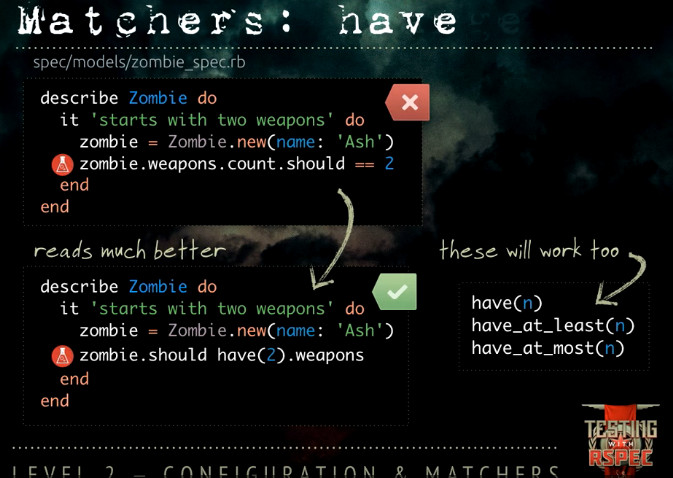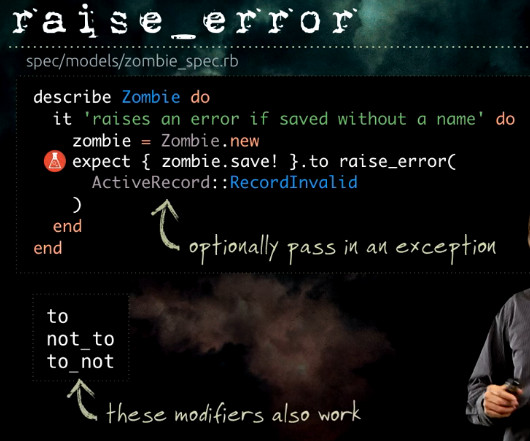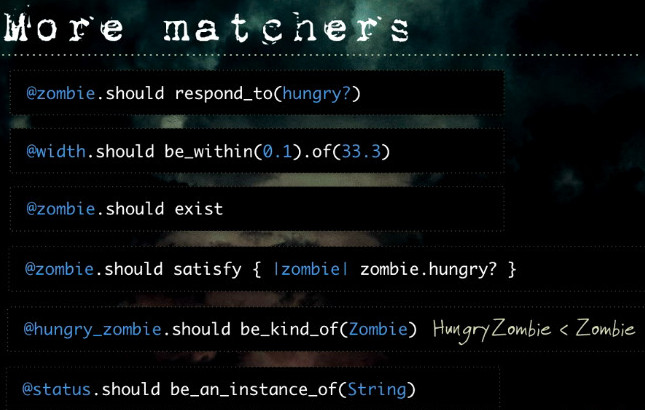Installing RSpec
In this level we'll start by getting you setup on a regular Ruby project, then move onto using RSpec within Rails. Let's start by installing the rspec gem from the console.
gem install rspec

Command Line
With the RSpec gem installed, you will have access to the command line tool, rspec.
RSpec has a few settings you can configure, so to help us get started, let's initialize this as an RSpec project. This will generate a placeholder for our RSpec configuration.
rspec --init
Rails Configuration
Using rspec --init will setup RSpec within a ruby project, but for the rest of this course we'll be using RSpec within a Rails project. Run the rails generator to install RSpec into the current Rails project.
rails generate rspec:install
Running specs from the command line
We now have a Rails project all setup and we've created spec/models/zombie_spec.rb for you. Run this spec from the command line with color on, and specify documentation format.
rspec --color --format documentation spec/models/zombie_spec.rb
Predicate Matchers
Refactor the following spec to use an include matcher.
class Zombie < ActiveRecord::Base validates :name, presence: true def genius? iq >= 3 end end
Answer:
describe Zombie do it 'includes a tweet' do tweet = Tweet.new zombie = Zombie.new(tweets: [tweet]) zombie.tweets.should include tweet end end
Change Matcher
In the following example, we're checking to see that a method changes the state of a zombie. We need to make sure the zombie was in a specific state before and after the method is called.
Refactor the following example to use the expect and change syntax.
class Zombie < ActiveRecord::Base validates :name, presence: true validates :iq, numericality: true def eat_brains self.iq += 3 end end
Answer:
describe Zombie do it 'gains 3 IQ points by eating brains' do zombie = Zombie.new #zombie.iq.should == 0 #zombie.eat_brains #zombie.iq.should == 3 expect {zombie.eat_brains}.to change {zombie.iq}.from(0).to(3) end end #what expect {zombie.eat_brains}.to change {zombie.iq}.from(0).to(3) #is saying that: #zombie eat_brains #then change zombie.iq #from 0 to 3 # format: #expect {action}.to change {value}.by(num) #or form(num1).to(num2)

Have Matcher
We're verifying the count to be greater than 0, but we really could be using a have matcher here to verify that the zombie has exactly one tweet. Refactor the spec to use the have matcher.
describe Zombie do it 'increases the number of tweets' do zombie = Zombie.new(name: 'Ash') zombie.tweets.new(message: "Arrrgggggggghhhhh") #zombie.tweets.count.should > 0 zombie.should have(1).tweets end end

Raises an Error
Testing for exceptions is tricky business. Refactor the spec below to use the raise_error matcher with an expect block.
class Tweet < ActiveRecord::Base attr_accessible :message belongs_to :zombie validates :message, presence: true end
class Zombie < ActiveRecord::Base validates :name, presence: true class NotSmartEnoughError < StandardError; end def genius? iq >= 3 end def make_decision! raise NotSmartEnoughError unless genius? return true end end
Answer:
describe Zombie do it 'raises a Zombie::NotSmartEnoughError if not able to make a decision' do zombie = Zombie.new #begin # zombie.make_decision! # rescue Zombie::NotSmartEnoughError => e # e.should be_an_instance_of(Zombie::NotSmartEnoughError) # end expect {zombie.make_decision!}.to raise_error( Zombie::NotSmartEnoughError ) end end

More matchers:
